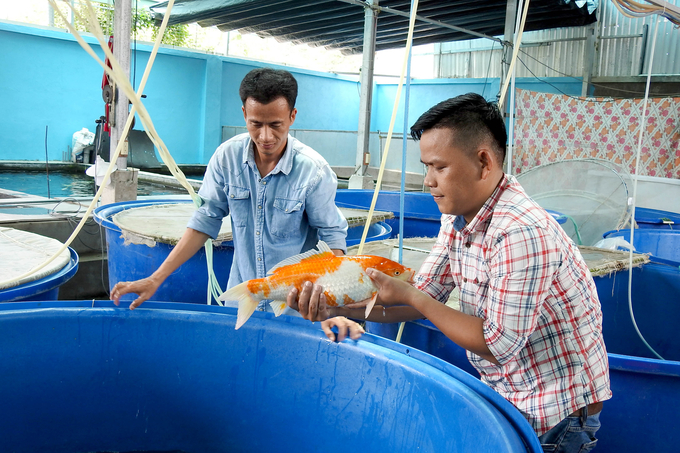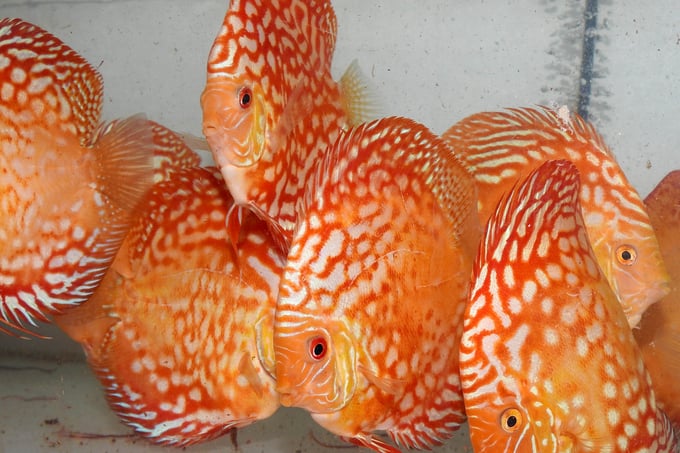May 21, 2025 | 07:32 GMT +7
May 21, 2025 | 07:32 GMT +7
Hotline: 0913.378.918
May 21, 2025 | 07:32 GMT +7
Hotline: 0913.378.918
Vietnamese ornamental fish farming and export activities in Ho Chi Minh City have continuously developed over the years. Businesses in the city has brought in 23 million USD from export of ornamental fish in 2019.
However, the Covid-19 pandemic in 2020 and 2021 has severely affected the city's ornamental fish industry. The export of ornamental fish, which is mainly by air, has been suspended for several months due to a lack of international flights in compliance with the pandemic prevention requirements.

Koi fish production at Viet Huan Koi Joint Stock Company in Cu Chi. Photo: Thanh Son.
During the time when Ho Chi Minh City and a series of other provinces and cities across the country implemented social distancing to control the pandemic, most businesses and farms operating in the ornamental fish industry in Ho Chi Minh City could not sell ornamental fish to the domestic market. Social distancing also made it difficult for businesses and farms to produce ornamental fish because of a shortage of food and necessary supplies.
Consequently, most businesses and farms have to find different approaches to maintain operations such as suspending fish hatching, reducing the size of commercial ornamental fish stocks and so on. Therefore, export of ornamental fish in Ho Chi Minh City has plummeted to 17 million USD and continued to decrease to 15 million USD in 2021.
Immediately after Ho Chi Minh City entered the "new normal" phase on October 1, 2021, ornamental fish businesses and farms in the city started restoring production and reconnecting with domestic and foreign customers.
Despite facing great difficulties such as high global inflation rate affecting the demand for ornamental fish, a reduced number of international commercial flights compared to before the Covid-19 pandemic, increased transportation costs, etc., ornamental fish exporters in Ho Chi Minh City are still making efforts to restore export activities. Many businesses and farms have received orders to export ornamental fish to the international market, although the number of orders is not as high as before.

Discus at Discus House farm in Cu Chi district, HCMC. Photo: Thanh Son.
Mr. Ngo Dang Linh, owner of Discus House farm, the largest fish farm in Vietnam with 30,000 to 40,000 fish in Cu Chi district, said that Discus House has resumed the supply of Discus fish to many foreign traders, although at only 30-40% the rate compared to before the Covid-19 pandemic. Discus House's ornamental fish export revenue was estimated at 1 million USD.
Many other ornamental fish businesses and farms in Cu Chi and Hoc Mon districts in Ho Chi Minh City have also re-exported to many markets such as Europe, America, China, etc.
Although the recovery process is ongoing in addition to many market difficulties, ornamental fish businesses and farms in the districts of Cu Chi and Hoc Mon in Ho Chi Minh City, hold a strong belief in the future of Vietnam's ornamental fish industry, when the demand is still increasing in the world market and Vietnamese ornamental fish have good competitiveness.
Mr. Nguyen Hoang Tuan, owner of a farm specializing in producing flowerhorn fish in Tan Hiep commune, Hoc Mon district, said that Vietnamese ornamental fish have a beautiful appearance because they are bred by a team of highly skilled artisans and have a competitive price compared to ornamental fish from many other countries.
Mr. Le Huu Thien, Director of Thien Duc Aquarium Joint Stock Company, said that there are Vietnamese ornamental fish products that have affirmed their position in the international market and are popular with consumers, such as: Discus. Many international customers claim that they find it very easy to take care of Vietnamese discus fish because the production process in Vietnam contains many natural elements such as utilizing natural food sources including earthworms, worms, cow hearts and so on; so the fish has a strong resilience with persistent colors.
According to Mr. Pham Lam Chinh Van, Director of Ho Chi Minh City Agricultural Extension Center, there are nearly 300 ornamental fish production establishments in the city, distributed mainly in some suburban districts, with a total area of 89 hectares (excluding the area of culture in glass tanks in establishments in central districts), the total annual output is estimated at 200 million fish.
The city's ornamental fish are now consumed throughout the provinces and cities in the country as well as exported to at least 60 markets across the world, with the main importing market being the Europe (accounting for 50% of exported ornamental fish), America (accounting for 20%), Asian countries among many others. The city's ornamental fish have recently reached new and potential markets such as South Africa and the Middle East.
Translated by Nguyen Hai Long

(VAN) Japan's grant aid project contributes to capacity building, promoting organic agricultural production, and fostering sustainable community development in Dong Thap province.

(VAN) For years, the CRISPR-Cas9 genome technology has been reshaping genetic engineering, a precision tool to transform everything from agriculture to medicine.

(VAN) Vietnam aims to become a 'leader' in the region in the capacity and managing effectively soil health and crop nutrition.
![Reducing emissions from rice fields: [Part 1] Farming clean rice together](https://t.ex-cdn.com/nongnghiepmoitruong.vn/608w/files/news/2025/05/05/z6509661417740_a647202949c539012a959e841c03e1d3-nongnghiep-143611.jpg)
(VAN) Growing clean rice helps reduce environmental pollution while increasing income, allowing farmers to feel secure in production and remain committed to their fields for the long term.
/2025/05/19/5136-1-144800_230.jpg)
(VAN) The Nghe An Provincial People's Committee has just approved the list of beneficiaries eligible for revenue from the Emission Reductions Payment Agreement (ERPA) in the North Central region for the year 2025.

(VAN) 14 out of 35 domesticated elephants in Dak Lak province have had their living conditions improved, with 11 of them currently participating in the non-riding elephant tourism model.

(VAN) Muong Nhe Nature Reserve hopes that being upgraded to a national park will lay the foundation for forest protection efforts to be carried out in a systematic, modern, and sustainable manner.